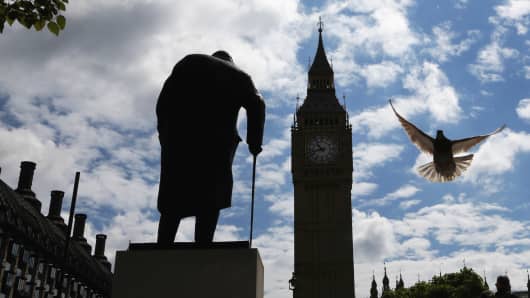This commentary originally appeared on Medium.
A few thoughts that are too long for Twitter on the immediate economic outlook.
- The most pressing problem now is uncertainty.
- Neither the government nor the leave campaign have set out a detailed vision of what "leave looks like." Of course even once one is set out , it will need to be agreed with the European Union, which will be far from straight forward.
- But for the next three months — whilst a new PM is elected — we will have extreme uncertainty. And that period of extreme uncertainty could well be extended further by a new general election.
- The extreme uncertainty phase will be followed by large uncertainty when exit talks actually begin.
- But at the moment, no one can say with any level of confidence what Britain's trading relationships, single market access and immigration policy will look like in the years ahead.
- Against this background, lots of business investment will simply stop. This is already happening.
- Some of that will just be a delay, some of it may be canceled for good. This is a perfectly rational thing for firms to do — especially anyone involved in exports
- The same applies to hiring plans for many larger firms.
- Faced with extreme uncertainty many households may choose to cut back on consumption and raise their savings in a precautionary manner. Again this is completely rational.
- Taken together less consumer spending and less business investment mean an immediate hit to economic demand and GDP.
- This will likely lead to a second round impact as other firms, seeing the economy begin to struggle cut back on their own hiring and investment plans.
- The base case now has to be a sharp slowdown in growth and very possibly a recession.
- Fiscal policy will loosen automatically as tax revenues fall and social security spending begins to rise. This will provide some support. But with what is essentially a caretaker government now in place and direct fiscal policy response appears unlikely. (This is a policy error).
- Sterling is likely to continue falling — a $/£ rate of 1.20 is being increasingly mentioned. (It's around 1.34 at the time of writing — down from 1.50 last Thursday evening).
- Inflation will rise as Sterling falls pushing up import costs. (This will hot real wages and may further harm consumer spending).
- Whilst the financial system (touch wood) looks reasonably sound (certainly in a much better place than in 2008) it is still likely that bank lending is going to slow.
- With fiscal policy apparently out of the game, it will be up to the Bank of England to respond in the coming months.
- Hopefully it will ease policy substantially. A combination of credit easing (a funding for lending type scheme) and more quantitative easing would be my base case. I'm not at all sure actual rate cuts would be helpful at this stage.
- However there is a real risk that the Bank of England will not ease as much as is desirable from a demand management perspective. Delayed and/or canceled investment will hit the supply-side of the economy and estimates of potential output growth. We are experiencing a simultaneous demand and supply hit, which may lead the Bank to assess that inflation will rise.
- In other words, we are looking at demand hit to the economy without much fiscal support and monetary support may be more limited than hoped for.
- Weaker sterling should provide some support for exporters and, unlike in 2008/09, our export markets are not in freefall. Although I would not bank on a export boom , many U.K. exports are either part of complex global supply chains and not as effected by currency moves as historically or simply not that price sensitive.
- The base case then is for at least four to six months rough months for the economy.
- The downside risk is the current account deficit. Or, to put it another way, the capital account surplus. Lots more on this here.
- The U.K. is reliant on financial inflows. This is the key point — the risk is not that capital starts flowing out but that capital stops flowing in.
- If the balance of payments becomes a problem, expect to see much faster falls in sterling and asset prices, a much bigger rise in inflation and larger hit to living standards. Hopefully that can be avoided but that is now the key downside risk.
- To finish on an optimistic note, unless there is financial contagion via the banking system, the direct impact on the rest of the world looks to be fairly muted. Maybe 0.2 percent to 0.3 percent off European growth and smaller hit elsewhere.


